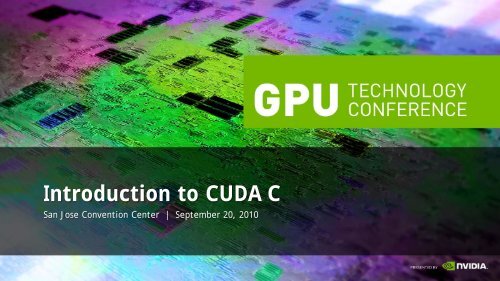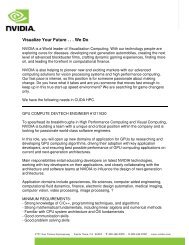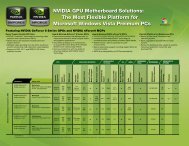Introduction to CUDA C
Introduction to CUDA C
Introduction to CUDA C
You also want an ePaper? Increase the reach of your titles
YUMPU automatically turns print PDFs into web optimized ePapers that Google loves.
<strong>Introduction</strong> <strong>to</strong> <strong>CUDA</strong> C<br />
San Jose Convention Center | September 20, 2010
Who Am I?<br />
� Jason Sanders<br />
� Senior Software Engineer, NVIDIA<br />
� Co-author of <strong>CUDA</strong> by Example
What is <strong>CUDA</strong>?<br />
� <strong>CUDA</strong> Architecture<br />
— Expose general-purpose GPU computing as first-class capability<br />
— Retain traditional DirectX/OpenGL graphics performance<br />
� <strong>CUDA</strong> C<br />
— Based on industry-standard C<br />
— A handful of language extensions <strong>to</strong> allow heterogeneous programs<br />
— Straightforward APIs <strong>to</strong> manage devices, memory, etc.<br />
� This talk will introduce you <strong>to</strong> <strong>CUDA</strong> C
<strong>Introduction</strong> <strong>to</strong> <strong>CUDA</strong> C<br />
� What will you learn <strong>to</strong>day?<br />
— Start from “Hello, World!”<br />
— Write and launch <strong>CUDA</strong> C kernels<br />
— Manage GPU memory<br />
— Run parallel kernels in <strong>CUDA</strong> C<br />
— Parallel communication and synchronization<br />
— Race conditions and a<strong>to</strong>mic operations
<strong>CUDA</strong> C Prerequisites<br />
� You (probably) need experience with C or C++<br />
� You do not need any GPU experience<br />
� You do not need any graphics experience<br />
� You do not need any parallel programming experience
<strong>CUDA</strong> C: The Basics<br />
� Terminology<br />
� Host – The CPU and its memory (host memory)<br />
� Device – The GPU and its memory (device memory)<br />
Host<br />
Note: Figure Not <strong>to</strong> Scale<br />
Device
Hello, World!<br />
int main( void ) {<br />
printf( "Hello, World!\n" );<br />
return 0;<br />
}<br />
� This basic program is just standard C that runs on the host<br />
� NVIDIA’s compiler (nvcc) will not complain about <strong>CUDA</strong> programs<br />
with no device code<br />
� At its simplest, <strong>CUDA</strong> C is just C!
Hello, World! with Device Code<br />
__global__ void kernel( void ) {<br />
}<br />
int main( void ) {<br />
}<br />
kernel();<br />
printf( "Hello, World!\n" );<br />
return 0;<br />
� Two notable additions <strong>to</strong> the original “Hello, World!”
Hello, World! with Device Code<br />
__global__ void kernel( void ) {<br />
}<br />
� <strong>CUDA</strong> C keyword __global__ indicates that a function<br />
— Runs on the device<br />
— Called from host code<br />
� nvcc splits source file in<strong>to</strong> host and device components<br />
— NVIDIA’s compiler handles device functions like kernel()<br />
— Standard host compiler handles host functions like main()<br />
� gcc<br />
� Microsoft Visual C
Hello, World! with Device Code<br />
int main( void ) {<br />
}<br />
kernel>();<br />
printf( "Hello, World!\n" );<br />
return 0;<br />
� Triple angle brackets mark a call from host code <strong>to</strong> device code<br />
— Sometimes called a “kernel launch”<br />
— We’ll discuss the parameters inside the angle brackets later<br />
� This is all that’s required <strong>to</strong> execute a function on the GPU!<br />
� The function kernel() does nothing, so this is fairly anticlimactic…
A More Complex Example<br />
� A simple kernel <strong>to</strong> add two integers:<br />
__global__ void add( int *a, int *b, int *c ) {<br />
}<br />
*c = *a + *b;<br />
� As before, __global__ is a <strong>CUDA</strong> C keyword meaning<br />
— add() will execute on the device<br />
— add() will be called from the host
A More Complex Example<br />
� Notice that we use pointers for our variables:<br />
__global__ void add( int *a, int *b, int *c ) {<br />
}<br />
*c = *a + *b;<br />
� add() runs on the device…so a, b, and c must point <strong>to</strong><br />
device memory<br />
� How do we allocate memory on the GPU?
Memory Management<br />
� Host and device memory are distinct entities<br />
— Device pointers point <strong>to</strong> GPU memory<br />
� May be passed <strong>to</strong> and from host code<br />
� May not be dereferenced from host code<br />
— Host pointers point <strong>to</strong> CPU memory<br />
� May be passed <strong>to</strong> and from device code<br />
� May not be dereferenced from device code<br />
� Basic <strong>CUDA</strong> API for dealing with device memory<br />
— cudaMalloc(), cudaFree(), cudaMemcpy()<br />
— Similar <strong>to</strong> their C equivalents, malloc(), free(), memcpy()
A More Complex Example: add()<br />
� Using our add()kernel:<br />
__global__ void add( int *a, int *b, int *c ) {<br />
}<br />
*c = *a + *b;<br />
� Let’s take a look at main()…
A More Complex Example: main()<br />
int main( void ) {<br />
int a, b, c; // host copies of a, b, c<br />
int *dev_a, *dev_b, *dev_c; // device copies of a, b, c<br />
int size = sizeof( int ); // we need space for an integer<br />
// allocate device copies of a, b, c<br />
cudaMalloc( (void**)&dev_a, size );<br />
cudaMalloc( (void**)&dev_b, size );<br />
cudaMalloc( (void**)&dev_c, size );<br />
a = 2;<br />
b = 7;
A More Complex Example: main() (cont)<br />
}<br />
// copy inputs <strong>to</strong> device<br />
cudaMemcpy( dev_a, &a, size, cudaMemcpyHostToDevice );<br />
cudaMemcpy( dev_b, &b, size, cudaMemcpyHostToDevice );<br />
// launch add() kernel on GPU, passing parameters<br />
add>( dev_a, dev_b, dev_c );<br />
// copy device result back <strong>to</strong> host copy of c<br />
cudaMemcpy( &c, dev_c, size, cudaMemcpyDeviceToHost );<br />
cudaFree( dev_a );<br />
cudaFree( dev_b );<br />
cudaFree( dev_c );<br />
return 0;
Parallel Programming in <strong>CUDA</strong> C<br />
� But wait…GPU computing is about massive parallelism<br />
� So how do we run code in parallel on the device?<br />
� Solution lies in the parameters between the triple angle brackets:<br />
add>( dev_a, dev_b, dev_c );<br />
add>( dev_a, dev_b, dev_c );<br />
� Instead of executing add() once, add() executed N times in parallel
Parallel Programming in <strong>CUDA</strong> C<br />
� With add() running in parallel…let’s do vec<strong>to</strong>r addition<br />
� Terminology: Each parallel invocation of add() referred <strong>to</strong> as a block<br />
� Kernel can refer <strong>to</strong> its block’s index with the variable blockIdx.x<br />
� Each block adds a value from a[] and b[], s<strong>to</strong>ring the result in c[]:<br />
__global__ void add( int *a, int *b, int *c ) {<br />
c[blockIdx.x] = a[blockIdx.x] + b[blockIdx.x];<br />
}<br />
� By using blockIdx.x <strong>to</strong> index arrays, each block handles different indices
Parallel Programming in <strong>CUDA</strong> C<br />
� We write this code:<br />
__global__ void add( int *a, int *b, int *c ) {<br />
}<br />
c[blockIdx.x] = a[blockIdx.x] + b[blockIdx.x];<br />
� This is what runs in parallel on the device:<br />
Block 0<br />
c[0] = a[0] + b[0];<br />
Block 2<br />
c[2] = a[2] + b[2];<br />
Block 1<br />
c[1] = a[1] + b[1];<br />
Block 3<br />
c[3] = a[3] + b[3];
Parallel Addition: add()<br />
� Using our newly parallelized add()kernel:<br />
__global__ void add( int *a, int *b, int *c ) {<br />
}<br />
c[blockIdx.x] = a[blockIdx.x] + b[blockIdx.x];<br />
� Let’s take a look at main()…
Parallel Addition: main()<br />
#define N 512<br />
int main( void ) {<br />
int *a, *b, *c; // host copies of a, b, c<br />
int *dev_a, *dev_b, *dev_c; // device copies of a, b, c<br />
int size = N * sizeof( int ); // we need space for 512 integers<br />
// allocate device copies of a, b, c<br />
cudaMalloc( (void**)&dev_a, size );<br />
cudaMalloc( (void**)&dev_b, size );<br />
cudaMalloc( (void**)&dev_c, size );<br />
a = (int*)malloc( size );<br />
b = (int*)malloc( size );<br />
c = (int*)malloc( size );<br />
random_ints( a, N );<br />
random_ints( b, N );
Parallel Addition: main() (cont)<br />
}<br />
// copy inputs <strong>to</strong> device<br />
cudaMemcpy( dev_a, a, size, cudaMemcpyHostToDevice );<br />
cudaMemcpy( dev_b, b, size, cudaMemcpyHostToDevice );<br />
// launch add() kernel with N parallel blocks<br />
add>( dev_a, dev_b, dev_c );<br />
// copy device result back <strong>to</strong> host copy of c<br />
cudaMemcpy( c, dev_c, size, cudaMemcpyDeviceToHost );<br />
free( a ); free( b ); free( c );<br />
cudaFree( dev_a );<br />
cudaFree( dev_b );<br />
cudaFree( dev_c );<br />
return 0;
Review<br />
� Difference between “host” and “device”<br />
— Host = CPU<br />
— Device = GPU<br />
� Using __global__ <strong>to</strong> declare a function as device code<br />
— Runs on device<br />
— Called from host<br />
� Passing parameters from host code <strong>to</strong> a device function
Review (cont)<br />
� Basic device memory management<br />
— cudaMalloc()<br />
— cudaMemcpy()<br />
— cudaFree()<br />
� Launching parallel kernels<br />
— Launch N copies of add() with: add>();<br />
— Used blockIdx.x <strong>to</strong> access block’s index
Threads<br />
� Terminology: A block can be split in<strong>to</strong> parallel threads<br />
� Let’s change vec<strong>to</strong>r addition <strong>to</strong> use parallel threads instead of parallel blocks:<br />
__global__ void add( int *a, int *b, int *c ) {<br />
}<br />
c[ threadIdx.x blockIdx.x ] = a[ threadIdx.x blockIdx.x ] + b[ threadIdx.x<br />
blockIdx.x<br />
];<br />
� We use threadIdx.x instead of blockIdx.x in add()<br />
� main() will require one change as well…
Parallel Addition (Threads): main()<br />
#define N 512<br />
int main( void ) {<br />
int *a, *b, *c; //host copies of a, b, c<br />
int *dev_a, *dev_b, *dev_c; //device copies of a, b, c<br />
int size = N * sizeof( int ); //we need space for 512 integers<br />
// allocate device copies of a, b, c<br />
cudaMalloc( (void**)&dev_a, size );<br />
cudaMalloc( (void**)&dev_b, size );<br />
cudaMalloc( (void**)&dev_c, size );<br />
a = (int*)malloc( size );<br />
b = (int*)malloc( size );<br />
c = (int*)malloc( size );<br />
random_ints( a, N );<br />
random_ints( b, N );
Parallel Addition (Threads): main() (cont)<br />
}<br />
// copy inputs <strong>to</strong> device<br />
cudaMemcpy( dev_a, a, size, cudaMemcpyHostToDevice );<br />
cudaMemcpy( dev_b, b, size, cudaMemcpyHostToDevice );<br />
// launch add() kernel with N threads blocks<br />
add>( dev_a, dev_b, dev_c );<br />
// copy device result back <strong>to</strong> host copy of c<br />
cudaMemcpy( c, dev_c, size, cudaMemcpyDeviceToHost );<br />
free( a ); free( b ); free( c );<br />
cudaFree( dev_a );<br />
cudaFree( dev_b );<br />
cudaFree( dev_c );<br />
return 0;
Using Threads And Blocks<br />
� We’ve seen parallel vec<strong>to</strong>r addition using<br />
— Many blocks with 1 thread apiece<br />
— 1 block with many threads<br />
� Let’s adapt vec<strong>to</strong>r addition <strong>to</strong> use lots of both blocks and threads<br />
� After using threads and blocks <strong>to</strong>gether, we’ll talk about why threads<br />
� First let’s discuss data indexing…
Indexing Arrays With Threads And Blocks<br />
� No longer as simple as just using threadIdx.x or blockIdx.x as indices<br />
� To index array with 1 thread per entry (using 8 threads/block)<br />
threadIdx.x<br />
0 1 2 3 4 5 6 7<br />
threadIdx.x<br />
0 1 2 3 4 5 6 7<br />
threadIdx.x<br />
0 1 2 3 4 5 6 7<br />
threadIdx.x<br />
0 1 2 3 4 5 6 7<br />
blockIdx.x = 0 blockIdx.x = 1 blockIdx.x = 2 blockIdx.x = 3<br />
� If we have M threads/block, a unique array index for each entry given by<br />
int index = threadIdx.x + blockIdx.x * M;<br />
int index = x + y * width;
Indexing Arrays: Example<br />
� In this example, the red entry would have an index of 21:<br />
0 1 2 3 4 5 6 7 8 9 10 11 12 13 14 15<br />
16 17 18 19 20 21<br />
M = 8 threads/block<br />
int index = threadIdx.x + blockIdx.x * M;<br />
= 5 + 2 * 8;<br />
= 21;<br />
blockIdx.x = 2
Addition with Threads and Blocks<br />
� The blockDim.x is a built-in variable for threads per block:<br />
int index= threadIdx.x + blockIdx.x * blockDim.x;<br />
� A combined version of our vec<strong>to</strong>r addition kernel <strong>to</strong> use blocks and threads:<br />
__global__ void add( int *a, int *b, int *c ) {<br />
}<br />
int index = threadIdx.x + blockIdx.x * blockDim.x;<br />
c[index] = a[index] + b[index];<br />
� So what changes in main() when we use both blocks and threads?
Parallel Addition (Blocks/Threads): main()<br />
#define N (2048*2048)<br />
#define THREADS_PER_BLOCK 512<br />
int main( void ) {<br />
int *a, *b, *c; // host copies of a, b, c<br />
int *dev_a, *dev_b, *dev_c; // device copies of a, b, c<br />
int size = N * sizeof( int ); // we need space for N integers<br />
// allocate device copies of a, b, c<br />
cudaMalloc( (void**)&dev_a, size );<br />
cudaMalloc( (void**)&dev_b, size );<br />
cudaMalloc( (void**)&dev_c, size );<br />
a = (int*)malloc( size );<br />
b = (int*)malloc( size );<br />
c = (int*)malloc( size );<br />
random_ints( a, N );<br />
random_ints( b, N );
Parallel Addition (Blocks/Threads): main()<br />
}<br />
// copy inputs <strong>to</strong> device<br />
cudaMemcpy( dev_a, a, size, cudaMemcpyHostToDevice );<br />
cudaMemcpy( dev_b, b, size, cudaMemcpyHostToDevice );<br />
// launch add() kernel with blocks and threads<br />
add>( dev_a, dev_b, dev_c );<br />
// copy device result back <strong>to</strong> host copy of c<br />
cudaMemcpy( c, dev_c, size, cudaMemcpyDeviceToHost );<br />
free( a ); free( b ); free( c );<br />
cudaFree( dev_a );<br />
cudaFree( dev_b );<br />
cudaFree( dev_c );<br />
return 0;
Why Bother With Threads?<br />
� Threads seem unnecessary<br />
— Added a level of abstraction and complexity<br />
— What did we gain?<br />
� Unlike parallel blocks, parallel threads have mechanisms <strong>to</strong><br />
— Communicate<br />
— Synchronize<br />
� Let’s see how…
Dot Product<br />
� Unlike vec<strong>to</strong>r addition, dot product is a reduction from vec<strong>to</strong>rs <strong>to</strong> a scalar<br />
a b<br />
a 0<br />
a 1<br />
a 2<br />
a 3<br />
*<br />
*<br />
*<br />
*<br />
b 0<br />
b 1<br />
b 2<br />
b 3<br />
c = a ∙ b<br />
+<br />
c = (a 0, a 1, a 2, a 3) ∙ (b 0, b 1, b 2, b 3)<br />
c = a 0 b 0 + a 1 b 1 + a 2 b 2 + a 3 b 3<br />
c
Dot Product<br />
� Parallel threads have no problem computing the pairwise products:<br />
a b<br />
a 0<br />
a 1<br />
a 2<br />
a 3<br />
*<br />
*<br />
*<br />
*<br />
b 0<br />
b 1<br />
b 2<br />
b 3<br />
� So we can start a dot product <strong>CUDA</strong> kernel by doing just that:<br />
__global__ void dot( int *a, int *b, int *c ) {<br />
// Each thread computes a pairwise product<br />
int temp = a[threadIdx.x] * b[threadIdx.x];<br />
+
Dot Product<br />
� But we need <strong>to</strong> share data between threads <strong>to</strong> compute the final sum:<br />
__global__ void dot( int *a, int *b, int *c ) {<br />
// Each thread computes a pairwise product<br />
int temp = a[threadIdx.x] * b[threadIdx.x];<br />
}<br />
a b<br />
a0 a1 a2 a3 *<br />
*<br />
*<br />
*<br />
b0 b1 b2 b3 // Can’t compute the final sum<br />
// Each thread’s copy of ‘temp’ is private<br />
+
Sharing Data Between Threads<br />
� Terminology: A block of threads shares memory called…shared<br />
memory<br />
� Extremely fast, on-chip memory (user-managed cache)<br />
� Declared with the __shared__ <strong>CUDA</strong> keyword<br />
� Not visible <strong>to</strong> threads in other blocks running in parallel<br />
Block 0<br />
Threads<br />
Shared Memory<br />
Block 1<br />
Threads<br />
Shared Memory<br />
Block 2<br />
Threads<br />
Shared Memory<br />
…
Parallel Dot Product: dot()<br />
� We perform parallel multiplication, serial addition:<br />
#define N 512<br />
__global__ void dot( int *a, int *b, int *c ) {<br />
// Shared memory for results of multiplication<br />
__shared__ int temp[N];<br />
temp[threadIdx.x] = a[threadIdx.x] * b[threadIdx.x];<br />
}<br />
// Thread 0 sums the pairwise products<br />
if( 0 == threadIdx.x ) {<br />
int sum = 0;<br />
for( int i = 0; i < N; i++ )<br />
sum += temp[i];<br />
*c = sum;<br />
}
Parallel Dot Product Recap<br />
� We perform parallel, pairwise multiplications<br />
� Shared memory s<strong>to</strong>res each thread’s result<br />
� We sum these pairwise products from a single thread<br />
� Sounds good…but we’ve made a huge mistake
Faulty Dot Product Exposed!<br />
� Step 1: In parallel<br />
parallel, each thread writes a pairwise product<br />
__shared__ int temp<br />
� Step 2: Thread 0 reads and sums the products<br />
__shared__ int temp<br />
� But there’s an assumption hidden in Step 1…
Read-Before-Write Hazard<br />
� Suppose thread 0 finishes its write in step 1<br />
� Then thread 0 reads index 12 in step 2<br />
� Before thread 12 writes <strong>to</strong> index 12 in step 1?<br />
This read returns garbage!
Synchronization<br />
� We need threads <strong>to</strong> wait between the sections of dot():<br />
__global__ void dot( int *a, int *b, int *c ) {<br />
__shared__ int temp[N];<br />
temp[threadIdx.x] = a[threadIdx.x] * b[threadIdx.x];<br />
}<br />
// * NEED THREADS TO SYNCHRONIZE HERE *<br />
// No thread can advance until all threads<br />
// have reached this point in the code<br />
// Thread 0 sums the pairwise products<br />
if( 0 == threadIdx.x ) {<br />
int sum = 0;<br />
for( int i = 0; i < N; i++ )<br />
sum += temp[i];<br />
*c = sum;<br />
}
__syncthreads()<br />
� We can synchronize threads with the function __syncthreads()<br />
� Threads in the block wait until all threads have hit the __syncthreads()<br />
Thread 0<br />
Thread 1<br />
Thread 2<br />
Thread 3<br />
Thread 4<br />
…<br />
__syncthreads()<br />
__syncthreads()<br />
__syncthreads()<br />
__syncthreads()<br />
__syncthreads()<br />
� Threads are only synchronized within a block
Parallel Dot Product: dot()<br />
__global__ void dot( int *a, int *b, int *c ) {<br />
__shared__ int temp[N];<br />
temp[threadIdx.x] = a[threadIdx.x] * b[threadIdx.x];<br />
}<br />
__syncthreads();<br />
if( 0 == threadIdx.x ) {<br />
int sum = 0;<br />
for( int i = 0; i < N; i++ )<br />
sum += temp[i];<br />
*c = sum;<br />
}<br />
� With a properly synchronized dot() routine, let’s look at main()
Parallel Dot Product: main()<br />
#define N 512<br />
int main( void ) {<br />
int *a, *b, *c; // copies of a, b, c<br />
int *dev_a, *dev_b, *dev_c; // device copies of a, b, c<br />
int size = N * sizeof( int ); // we need space for 512 integers<br />
// allocate device copies of a, b, c<br />
cudaMalloc( (void**)&dev_a, size );<br />
cudaMalloc( (void**)&dev_b, size );<br />
cudaMalloc( (void**)&dev_c, sizeof( int ) );<br />
a = (int *)malloc( size );<br />
b = (int *)malloc( size );<br />
c = (int *)malloc( sizeof( int ) );<br />
random_ints( a, N );<br />
random_ints( b, N );
Parallel Dot Product: main()<br />
}<br />
// copy inputs <strong>to</strong> device<br />
cudaMemcpy( dev_a, a, size, cudaMemcpyHostToDevice );<br />
cudaMemcpy( dev_b, b, size, cudaMemcpyHostToDevice );<br />
// launch dot() kernel with 1 block and N threads<br />
dot>( dev_a, dev_b, dev_c );<br />
// copy device result back <strong>to</strong> host copy of c<br />
cudaMemcpy( c, dev_c, sizeof( int ) , cudaMemcpyDeviceToHost );<br />
free( a ); free( b ); free( c );<br />
cudaFree( dev_a );<br />
cudaFree( dev_b );<br />
cudaFree( dev_c );<br />
return 0;
Review<br />
� Launching kernels with parallel threads<br />
— Launch add() with N threads: add>();<br />
— Used threadIdx.x <strong>to</strong> access thread’s index<br />
� Using both blocks and threads<br />
— Used (threadIdx.x + blockIdx.x * blockDim.x) <strong>to</strong> index input/output<br />
— N/THREADS_PER_BLOCK blocks and THREADS_PER_BLOCK threads gave us N threads <strong>to</strong>tal
Review (cont)<br />
� Using __shared__ <strong>to</strong> declare memory as shared memory<br />
— Data shared among threads in a block<br />
— Not visible <strong>to</strong> threads in other parallel blocks<br />
� Using __syncthreads() as a barrier<br />
— No thread executes instructions after __syncthreads() until all<br />
threads have reached the __syncthreads()<br />
— Needs <strong>to</strong> be used <strong>to</strong> prevent data hazards
Multiblock Dot Product<br />
� Recall our dot product launch:<br />
// launch dot() kernel with 1 block and N threads<br />
dot>( dev_a, dev_b, dev_c );<br />
� Launching with one block will not utilize much of the GPU<br />
� Let’s write a multiblock version of dot product
Multiblock Dot Product: Algorithm<br />
� Each block computes a sum of its pairwise products like before:<br />
Block 0<br />
a b<br />
a 0<br />
a 1<br />
a 2<br />
a 3<br />
…<br />
*<br />
*<br />
*<br />
*<br />
b 0<br />
b 1<br />
b 2<br />
b 3<br />
Block 1<br />
a b<br />
a 512<br />
a 513<br />
a 514<br />
a 515<br />
…<br />
*<br />
*<br />
*<br />
*<br />
…<br />
b 512<br />
b 513<br />
b 514<br />
b 515<br />
…<br />
+<br />
+<br />
sum<br />
sum
Multiblock Dot Product: Algorithm<br />
� And then contributes its sum <strong>to</strong> the final result:<br />
Block 0<br />
a b<br />
a 0<br />
a 1<br />
a 2<br />
a 3<br />
…<br />
*<br />
*<br />
*<br />
*<br />
b 0<br />
b 1<br />
b 2<br />
b 3<br />
Block 1<br />
a b<br />
a 512<br />
a 513<br />
a 514<br />
a 515<br />
…<br />
*<br />
*<br />
*<br />
*<br />
…<br />
b 512<br />
b 513<br />
b 514<br />
b 515<br />
…<br />
+<br />
+<br />
sum<br />
sum<br />
c
Multiblock Dot Product: dot()<br />
#define N (2048*2048)<br />
#define THREADS_PER_BLOCK 512<br />
__global__ void dot( int *a, int *b, int *c ) {<br />
__shared__ int temp[THREADS_PER_BLOCK];<br />
int index = threadIdx.x + blockIdx.x * blockDim.x;<br />
temp[threadIdx.x] = a[index] * b[index];<br />
}<br />
__syncthreads();<br />
if( 0 == threadIdx.x ) {<br />
int sum = 0;<br />
for( int i = 0; i < THREADS_PER_BLOCK; i++ )<br />
sum += temp[i];<br />
*c a<strong>to</strong>micAdd( += sum; c , sum );<br />
}<br />
� But we have a race condition…<br />
� We can fix it with one of <strong>CUDA</strong>’s a<strong>to</strong>mic operations
Race Conditions<br />
� Terminology: A race condition occurs when program behavior depends upon<br />
relative timing of two (or more) event sequences<br />
� What actually takes place <strong>to</strong> execute the line in question: *c += sum;<br />
— Read value at address c<br />
— Add sum <strong>to</strong> value<br />
— Write result <strong>to</strong> address c<br />
� What if two threads are trying <strong>to</strong> do this at the same time?<br />
� Thread 0, Block 0<br />
— Read value at address c<br />
— Add sum <strong>to</strong> value<br />
— Write result <strong>to</strong> address c<br />
Terminology: Read-Modify-Write<br />
� Thread 0, Block 1<br />
— Read value at address c<br />
— Add sum <strong>to</strong> value<br />
— Write result <strong>to</strong> address c
Global Memory Contention<br />
Block 0<br />
sum = 3<br />
*c += sum<br />
Block 1<br />
sum = 4<br />
Reads 0<br />
0<br />
Read-Modify-Write<br />
Computes 0+3 Writes 3<br />
0+3 = 3 3<br />
c 0<br />
0 3<br />
3 3<br />
7<br />
3<br />
Reads 3<br />
3+4 = 7 7<br />
Computes 3+4 Writes 7<br />
Read-Modify-Write
Global Memory Contention<br />
Block 0<br />
sum = 3<br />
*c += sum<br />
Block 1<br />
sum = 4<br />
Reads 0<br />
0<br />
Computes 0+3<br />
Writes 3<br />
0+3 = 3 3<br />
c 0<br />
0 0<br />
0 3<br />
4<br />
0<br />
Reads 0<br />
Read-Modify-Write<br />
0+4 = 4 4<br />
Computes 0+4<br />
Writes 4<br />
Read-Modify-Write
A<strong>to</strong>mic Operations<br />
� Terminology: Read-modify-write uninterruptible when a<strong>to</strong>mic<br />
� Many a<strong>to</strong>mic operations on memory available with <strong>CUDA</strong> C<br />
� a<strong>to</strong>micAdd()<br />
� a<strong>to</strong>micSub()<br />
� a<strong>to</strong>micMin()<br />
� a<strong>to</strong>micMax()<br />
� a<strong>to</strong>micInc()<br />
� a<strong>to</strong>micDec()<br />
� a<strong>to</strong>micExch()<br />
� a<strong>to</strong>micCAS()<br />
� Predictable result when simultaneous access <strong>to</strong> memory required<br />
� We need <strong>to</strong> a<strong>to</strong>mically add sum <strong>to</strong> c in our multiblock dot product
Multiblock Dot Product: dot()<br />
__global__ void dot( int *a, int *b, int *c ) {<br />
__shared__ int temp[THREADS_PER_BLOCK];<br />
int index = threadIdx.x + blockIdx.x * blockDim.x;<br />
temp[threadIdx.x] = a[index] * b[index];<br />
}<br />
__syncthreads();<br />
if( 0 == threadIdx.x ) {<br />
int sum = 0;<br />
for( int i = 0; i < THREADS_PER_BLOCK; i++ )<br />
sum += temp[i];<br />
a<strong>to</strong>micAdd( c , sum );<br />
}<br />
� Now let’s fix up main() <strong>to</strong> handle a multiblock dot product
Parallel Dot Product: main()<br />
#define N (2048*2048)<br />
#define THREADS_PER_BLOCK 512<br />
int main( void ) {<br />
int *a, *b, *c; // host copies of a, b, c<br />
int *dev_a, *dev_b, *dev_c; // device copies of a, b, c<br />
int size = N * sizeof( int ); // we need space for N ints<br />
// allocate device copies of a, b, c<br />
cudaMalloc( (void**)&dev_a, size );<br />
cudaMalloc( (void**)&dev_b, size );<br />
cudaMalloc( (void**)&dev_c, sizeof( int ) );<br />
a = (int *)malloc( size );<br />
b = (int *)malloc( size );<br />
c = (int *)malloc( sizeof( int ) );<br />
random_ints( a, N );<br />
random_ints( b, N );
Parallel Dot Product: main()<br />
}<br />
// copy inputs <strong>to</strong> device<br />
cudaMemcpy( dev_a, a, size, cudaMemcpyHostToDevice );<br />
cudaMemcpy( dev_b, b, size, cudaMemcpyHostToDevice );<br />
// launch dot() kernel<br />
dot>( dev_a, dev_b, dev_c );<br />
// copy device result back <strong>to</strong> host copy of c<br />
cudaMemcpy( c, dev_c, sizeof( int ) , cudaMemcpyDeviceToHost );<br />
free( a ); free( b ); free( c );<br />
cudaFree( dev_a );<br />
cudaFree( dev_b );<br />
cudaFree( dev_c );<br />
return 0;
Review<br />
� Race conditions<br />
— Behavior depends upon relative timing of multiple event sequences<br />
— Can occur when an implied read-modify-write is interruptible<br />
� A<strong>to</strong>mic operations<br />
— <strong>CUDA</strong> provides read-modify-write operations guaranteed <strong>to</strong> be a<strong>to</strong>mic<br />
— A<strong>to</strong>mics ensure correct results when multiple threads modify memory
To Learn More <strong>CUDA</strong> C<br />
� Check out <strong>CUDA</strong> by Example<br />
— Parallel Programming in <strong>CUDA</strong> C<br />
— Thread Cooperation<br />
— Constant Memory and Events<br />
— Texture Memory<br />
— Graphics Interoperability<br />
— A<strong>to</strong>mics<br />
— Streams<br />
— <strong>CUDA</strong> C on Multiple GPUs<br />
— Other <strong>CUDA</strong> Resources<br />
� For sale here at GTC<br />
� http://developer.nvidia.com/object/cuda-by-example.html
Questions<br />
� First my questions<br />
� Now your questions…

















